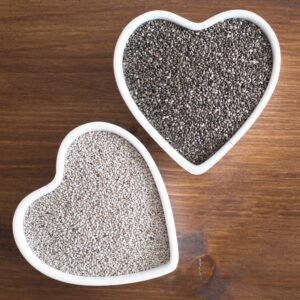I. Introduction of Chia Seeds


Chia seeds are tiny black or white seeds that come from the Salvia hispanica plant, which is a member of the mint family. These seeds have been prized for centuries for their nutritional and medicinal properties, and have gained popularity in recent years as a superfood.
Chia seeds are a rich source of omega-3 fatty acids, antioxidants, fiber, protein, and various vitamins and minerals. They are also low in calories and gluten-free, making them a popular choice for those following a gluten-free or low-calorie diet.
Chia seeds are incredibly versatile and can be easily incorporated into a variety of dishes. They can be added to smoothies, oatmeal, yogurt, salads, or baked goods, or used as a thickening agent in soups and sauces. When mixed with liquid, chia seeds develop a gel-like texture, which can be used as a vegan egg substitute in recipes.
Overall, chia seeds are a nutrient-dense superfood that can easily be incorporated into a healthy diet to boost overall health and well-being.
II. Benefits of Chia Seeds in our life






High in nutrients: Chia seeds are packed with essential nutrients such as protein, fiber, omega-3 fatty acids, calcium, magnesium, and antioxidants.
Supports digestive health: The high fiber content of chia seeds helps improve digestion by promoting regular bowel movements and feeding the beneficial bacteria in our gut.
Boosts energy levels: The combination of protein, fiber, and healthy fats in chia seeds provides a sustained release of energy, making them a great addition to your diet for long-lasting energy levels.
Supports weight loss: Chia seeds can help with weight loss due to their high fiber content, which helps keep you feeling full and satisfied for longer periods of time.
Improves heart health: Chia seeds are rich in omega-3 fatty acids, which have been shown to reduce inflammation and lower the risk of heart disease.
Regulates blood sugar levels: The high fiber and protein content in chia seeds can help stabilize blood sugar levels, making them a beneficial addition to a diabetic-friendly diet.
Supports bone health: Chia seeds are an excellent source of calcium, magnesium, and phosphorus, which are essential for maintaining strong and healthy bones.
Anti-inflammatory properties: The antioxidants found in chia seeds help reduce inflammation in the body, which can help prevent chronic diseases and promote overall health.
Easy to incorporate into your diet: Chia seeds are versatile and easy to incorporate into your daily routine, whether sprinkled on top of yogurt or salad, added to smoothies, or used in baking recipes.
Gluten-free and vegan-friendly: Chia seeds are naturally gluten-free and suitable for those following a vegan or vegetarian diet, making them a great option for a wide range of dietary needs.
In addition to their nutritional benefits, chia seeds are also believed to have numerous health benefits. Some studies suggest that they may help improve blood sugar control, promote gut health, reduce inflammation, and aid in weight loss.
III. Difference between White and Black Chia Seeds


White and black chia seeds are the same species of plant (Salvia hispanica), but they differ in color and slightly in nutritional composition.
Color: The most obvious difference between white and black chia seeds is their color. White chia seeds are a light beige color, while black chia seeds are, as the name suggests, black.
Nutritional composition: While both white and black chia seeds are highly nutritious, there are slight differences in their nutritional composition. Black chia seeds are slightly higher in antioxidants, which are beneficial for overall health and well-being. They also contain slightly more omega-3 fatty acids, which are important for brain health and reducing inflammation. On the other hand, white chia seeds are slightly higher in protein and fiber content.
Taste: Some people claim that black chia seeds have a slightly stronger flavor compared to white chia seeds, but the difference in taste is minimal and may not be noticeable to all individuals.
Ultimately, both white and black chia seeds are highly nutritious and can be incorporated into a healthy diet. The choice between the two comes down to personal preference and any specific health goals or dietary needs.
IV. Which countries has high demand of Chia Seeds


Chia seeds are in high demand in several countries around the world, including:
United States: The US is one of the largest markets for chia seeds, with a growing awareness of their health benefits and a demand for superfoods.
Mexico: Chia seeds have been grown and consumed in Mexico for centuries and continue to be a popular ingredient in traditional dishes.
Russia: Chia seeds is popular seeds in Russia for its benefits and nutrients.
Australia: The demand for chia seeds in Australia has been steadily increasing due to the rise in health-conscious consumers and the popularity of superfoods.
Canada: Canadian consumers are increasingly incorporating chia seeds into their diets, leading to a growing demand for the product.
European countries: Several European countries, such as the UK, Germany, and Spain, have seen an increase in demand for chia seeds as consumers seek out healthy and nutritious food options.
Overall, the global demand for chia seeds is expected to continue to grow as more people become aware of their nutritional benefits and versatility in cooking.
V. How to use chia seeds for fat lose?




Chia seeds are a great source of fiber and Omega-3 fatty acids, which can help with weight loss. Here are a few ways you can include chia seeds in your diet:
Chia seed pudding: Mix chia seeds with almond milk or coconut milk and let it sit overnight in the fridge to thicken. Add sweeteners or toppings like berries or nuts for a delicious and filling breakfast or snack.
Add to smoothies: Sprinkle chia seeds into your favorite smoothie recipe for an added boost of nutrition and texture.
Use as a topping: Sprinkle chia seeds on top of yogurt, oatmeal, or salads for extra crunch and nutrients.
Make chia gel: Mix chia seeds with water to create a gel-like substance that can be used as a thickening agent in recipes like soups, sauces, and dressings.
Substitute for eggs: Chia seeds can be used as a vegan egg replacer in baking recipes. Simply mix 1 tablespoon of chia seeds with 3 tablespoons of water and let it sit for a few minutes until it forms a gel-like consistency.
Remember to drink plenty of water when consuming chia seeds, as they absorb water and can help you feel fuller for longer. Additionally, incorporate chia seeds into a balanced diet and exercise routine for best results in weight loss.
VI. FAQs


Q. Which ingredients we get from Chia Seeds?
Ans. Chia seeds are a rich source of omega-3 fatty acids, antioxidants, fiber, protein, and various vitamins and minerals.
Q. Are there any other uses except eat?
Ans. Yes, you can use chia seeds as a face mask and make gel of chia seeds.
Q. I want to Import chia seeds, how can I do?
Ans. PENTASTAR INTERNATIONAL is a leading exporter of Chia Seeds from India, Premium quality chia seeds supplier from India.
Q. Where can I find authentic Chia Seeds?
Ans. India is one of the best sources of Chia Seeds, We PENTASTAR INTERNATIONL exporting chia seeds more than 10 countries, join our happy customer group.
